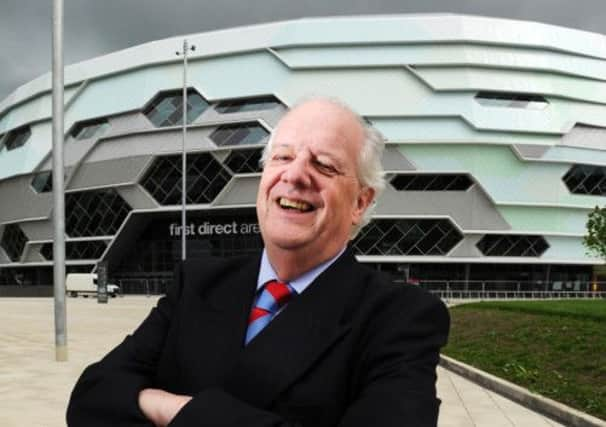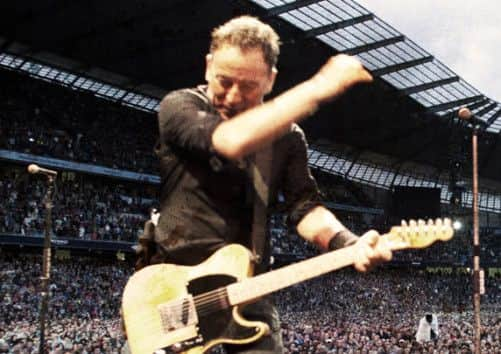Andrew Carter: ‘I’m looking forward to the first concert and, yes, I will be paying for my tickets’


STANDING in front of the futuristic facade of the First Direct Arena in Leeds, 64-year-old Conservative councillor Andrew Carter doesn’t cut for a figure you’d associate with a venue set to be dominated by pop and rock.
“You’re stereotyping Mr McPhee,” he says, laughing at the suggestion. “That’s what you’re doing.”
Advertisement
Hide AdAdvertisement
Hide AdHe’s right, it is stereotyping. But it’s fair to say that he doesn’t look like your typical fan of Kaiser Chiefs. Or Depeche Mode. Certainly not JLS.


All of the above are on the 13,500 capacity arena’s bill this autumn, and that arena may not have been built were it not for Coun Carter.
It turns out this fact shouldn’t surprised us at all.
“I love my music,” he says. “I think those of my age – those who remember me years ago – would say ‘the arena is precisely what we’d expect of an old rocker like Carter’.
“I’m very much looking forward to the first concert and, yes, I will be paying for my tickets.”
Advertisement
Hide AdAdvertisement
Hide AdThat first gig is Bruce Springsteen on July 24, a global rock icon whose appearance represents a real coup for the arena, for the city and for the local authority that helped build it in the first place.
Back in the Noughties when no one had even heard of a credit crunch, Coun Carter was joint leader of an administration in civic hall made up of Tories and LibDems.
Both parties decided to free up some serious spending power by selling off Leeds/Bradford Airport, a venture in which Leeds City Council had a 40 per cent stake.
The end result? A whacking £55m in the local authority’s bank account, almost half of which was eventually earmarked as a financial bedrock for the arena.
Advertisement
Hide AdAdvertisement
Hide Ad“It just struck me that we should do something with a chunk of that money that was a clear statement of the city’s vision for the future,” says Coun Carter. “My view was that an arena for popular music had to be top of the agenda. Previous administrations had tried on two occasions to do the same and it just hadn’t happened.
“I have to say the current administration was pretty lukewarm at the time – I didn’t get a lot of support from them. But ultimately, it was a council decision.”
In discussion, Coun Carter initially underplays his role in getting the whole ball rolling. The reality is that he didn’t just face opposition among politicians in different parties, one or two high-profile Conservatives expressed their scepticism too. But he remained undeterred.
Strange then that he’s slipped a little off the arena radar since the Conservatives and LibDems lost power to Labour three years ago.
Advertisement
Hide AdAdvertisement
Hide Ad“If I sat and brooded about it, I’d think to myself: ‘Well, this lot are trying to claim the credit for something they’ve not done!’ But that’s politics, it’s not how I really feel either.”
He maintains the incoming administration, led by Coun Keith Wakefield, had reached the point of no return – in terms of public relations and financial constraints. But he doesn’t believe they would have axed the project even if they could. By 2010, most civic leaders were convinced Leeds Arena was a necessity.
“I mean, look at the Trinity scheme.” says Coun Carter. “They stopped work because of the crash, but how many other stalled UK shopping precincts restarted since 2008? Not one. But in Leeds the developers wanted to get the Trinity development open in time for the launch of the arena.
“Besides, why should people in Leeds and the surrounding are have to trail to Sheffield or Manchester or Nottingham to see popular music?”
Advertisement
Hide AdAdvertisement
Hide AdBut does he feel the arena is essentially his baby, his legacy after almost half a century in local politics?
“I suppose its the most tangible thing I could point to and say: ‘That project would possibly not have happened if we hadn’t taken the opportunity when it arose.’
“It coincided with a whole series of projects we wanted to pursue in the city. The cultural partnership had identified the potential need for a concert hall, an arena and a conference facility.
“But it then fell to the development department, of which I was the political head, to move it forward. I was the politician who was reporting on a regular basis to the rest of the cabinet and council on how we progressed it. So, yes, it was my project, but so were many others.”
Advertisement
Hide AdAdvertisement
Hide AdNumber two and three on the cultural shopping list was a conference centre and a concert hall, both of which might have been viewed as a more appropriate choice for Conservative council leader.
And there’s no understating his true blue credentials either.
Although he was born and raised in Farsley, west Leeds, he came from a middle class family of businessmen and, from the age of 11, he was privately educated at Fulneck School in Pudsey.
By the time he was 16 he’d already joined the Tory party and left school with the aim getting into business as soon as possible.He wanted to follow in the footsteps of his father, Jack, who, with his grandfather Charles Alfred Carter, set up a small textiles business in a mill on the site of what is now the Hilton hotel in Leeds city centre.
Advertisement
Hide AdAdvertisement
Hide AdWith such a past it would have required a staggering turn of events to have steered him off the Tory path, a path which his paternal family (who came from working class stock in Huddersfield) set him on.
After becoming a councillor at the age of 22. He established himself in civic hall throughout the 1970s and, in the same year that Margaret Thatcher became prime minister, he stood for parliament in East Leeds – a brave move given the fact that he was up against the presiding MP, Denis Healey.
“I didn’t win but I cut his majority by quite a lot – about 4,000 votes,” says Coun Carter. “But you never saw him. I only saw Healey on election night. But, in fairness to him, he was the Chancellor of the Exchequer and he was going around the country doing what he had to do while I was knocking on doors. In 1987. I had a crack at north east Leeds too, but I was pretty half hearted to be honest with you.
“I suppose the more I looked at parliament I thought: ‘what do the majority of these MPs ever actually achieve?’ So I’m more than content with what I hope I have achieved while I’ve been in local politics.”
Advertisement
Hide AdAdvertisement
Hide AdA year after standing against Healey he became the leader of the Leeds Conservative group. But, simultaneously, his darkest hour arrived – his father, Jack, discovered he had terminal cancer and died within months of the diagnosis.
“Not many days go by when I don’t think about my father,” he admits. “Even if it’s only ‘Now, what would my dad have done about that?’ I didn’t realise in younger life the influence that he would be, but he has been a big inspiration in my life, as has my mother, but my father in particular, because of how he got on with life.”
More heartbreak followed three years later when Coun Carter and his first wife, Janet, separated. “We’re still on very good terms, incidentally” he adds.
But things really turned a corner for the councillor in the following decade. He married his second wife, Amanda, in 1992. Three years later they had a son, Jack, who’s now 18 and considering a career in the army. The family now live in Calverley, just a few miles from where Coun Carter grew up
Advertisement
Hide AdAdvertisement
Hide AdFrom 2004 to 2010 he presided, with Coun Mark Harris, over the longest non-Labour administration in Leeds since the war, and it was during this time that he secured what must, surely, go down as his greatest legacy.
On consideration, it is perhaps because of, not inspite of, his Conservatism that he was determined to create Leeds Arena – coming from a line of self-made entrepreneurs, he knew a good deal when he saw one.
He says: “We will have put in £23m of council money and got an asset worth in excess of £80m. Well, that’s got to be good business. To be frank, I think it’s the best piece of business that’s ever been done in this city.”
ANDREW CARTER: LIFE AND TIMES
Born: Leeds, April 30, 1949.
Lives: Calverley, Leeds.
Family: Wife, Amanda. Son, Jack, and step-daughter, Sarah.
Career: 1971 – Elected at the age of 22 to Pudsey Borough Council; 1973 – Elected to Leeds City Council; 1979 – Made chair of Leeds City Council’s Housing Committee; 1980 – Became leader of Leeds Conservative group; 2004 – Became joint leader of Leeds City Council.
Advertisement
Hide AdAdvertisement
Hide AdEmployment: Trainee architectural technician at Harry Webster & CO, Leeds; Contracts manager, the Marley Tile Company, Leeds. National sales. manager, sales director, Heckmondwicke FB; Board member, National Floor Coverings.